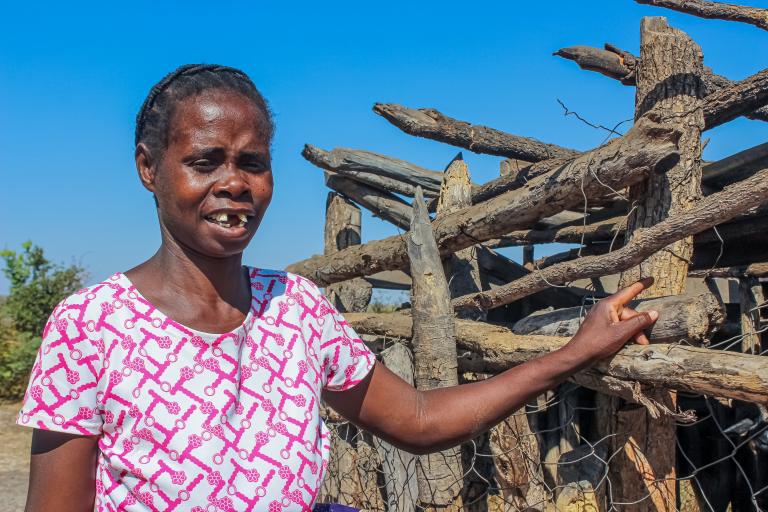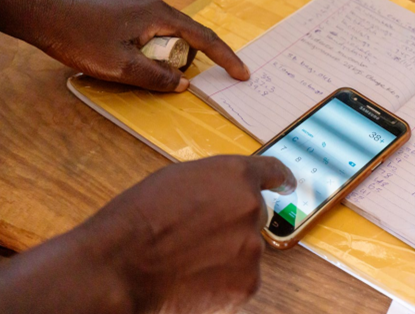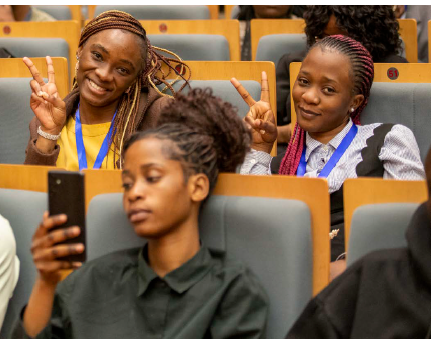Beneficiary Voices
You can read more beneficiary stories from the report here.
Making a Difference- Zambia Smallholder Farmers Benefit From Climate-Resilient Farming
In Western Zambia, the Strengthening Climate Resilience of Agricultural Livelihoods in Agro-Ecological Regions I and II (SCRALA) project is transforming the lives of vulnerable smallholder farmers.

Implemented by the Zambian Government with funding from the Green Climate Fund (GCF) and support by the United Nations Development Programme (UNDP), Food and Agriculture Organisation (FAO), and World Food Programme (WFP), the project targets vulnerable smallholder farmers at risk of being left behind, such as women, the youth, persons with disabilities and the elderly. It aims to reach more than one million people, including transforming the lives of more than 940,000 farmers in Zambia.
Among those benefiting from the initiative is
Nanswau, is a single mother of three daughters and a son and the sole provider for her family. In the past, Nanswau struggled to make ends meet. She lacked a reliable source of income, depending primarily on small-scale farming, cultivating crops such as beans, maize, and groundnuts. Her yields were frequently impacted by climate-related factors such as drought and flash floods.
Witnessing her children go hungry and sleep in an unstable thatched-roof house became an overwhelming source of concern for her. “I would constantly worry about my children’s well-being and spend sleepless nights praying for opportunities to make a steady income so I could support them,” Nanswau said.
“When my crops were affected by drought, we did not have any harvest and ended up cutting down on meals; at times we would sleep on empty stomachs. When I did piecemeal work on other people’s farms, I would buy a 2kg bag of maize meal that would only last us a day and this meant not eating the following days,” she said.
The SCARLA project provides comprehensive support to small-scale farmers throughout the agricultural value chain, from farm to market. This encompasses agricultural planning, production guidance, and post-production assistance, along with access to reliable weather information to enable farmers to make informed decisions, including which crops to plant and when.
Nanswau enrolled in the project’s pass-on mechanism- the model provides goats (four female and one male) to individuals who have been severely affected by climate change-especially focusing on women and persons with disabilities because they are disproportionately affected by the effects of climate change. Under the mechanism, each participant initially receives five goats and subsequently, once their herd grows to 10, they pass on five goats to the next person in line.
“I was very happy when I received five goats last year because I knew for sure this meant a better life for me and my children, so I looked after the goats so well,” Nanswau said.
“I have managed to buy roofing sheets to renovate the house for me and my children. Before, we lived in constant fear of the thatched roof falling on us, especially during the rainy season,” said Nanswau.
After her goats reproduced, she proceeded to transfer five goats to another female small-scale farmer in her village while keeping 15 goats for herself. She then sold five of them for 4,000 Zambian Kwacha.
“After selling my goats, I immediately engaged a local contractor to put a roof of iron sheets on my house and I paid him the entire amount from the sales. In a few weeks, the roofing was complete, and my family could not wait to sleep in the house,” she said.
Empowered by the income from her goat sales, Nanswau also expanded her sources of income by rearing village chickens. She now owns over 20 which she can sell one at 50 ZMW each. She also cultivates vegetables such as tomatoes, rape and Chinese cabbage and can make approximately ZMW 400 per month.
The extra income has not only improved her household’s financial stability but also allowed her to invest in essential items such as goat medications and resilient seedlings capable of withstanding the harsh effects of climate change. Apart from that, Nanswau can afford three meals a day for her family and her children’s school attendance has significantly improved leading to better results.
Enhancing Youth and Women Opportunities
A total of 500 young people (48% Male: 52% Female) had increased access to work placements and the growth of job skills through the Internship, work placements in government ministries and agencies, Volunteer, Apprenticeship and Graduate (IVAG) Programme under Phase One of the GRZ-UN Joint Programme on Youth supported by the UN. An additional 32 were placed in UN agencies. Further, the Government placed an additional 1,000 young people in Government institutions. Through the programme, young people from all parts of Zambia, including people with disabilities, are integrated in various Government entities and departments, but also within the private sector and the UN system, contributing meaningfully to Zambia’s social and economic development.
In another UN-led initiative, university students from low-income backgrounds were empowered with resources for ideation, training, coaching, and developing solutions through the UniPod, an innovative platform established by UNDP at the Copperbelt University and implemented in collaboration with the National Institute for Scientific and Industrial Research in Zambia. Designed to be a dynamic physical space, through fabricating and prototyping, the UniPod facilitates the transformation of innovative ideas into viable business ventures. The UniPod seeks to drive youth innovation and entrepreneurship, contributing significantly to the SDGs.

In the same vein of supporting key populations groups, youth and women led Micro, Small and Medium-sized Enterprises (MSMEs) were assisted to access market opportunities in regional markets through a programme aimed at reducing trade barriers faced by informal businesses under the Africa Continental Free Trade Area (AfCFTA).
Further, the Accelerator Lab leveraged building on lessons from the Africa Borderlands Centre Cross Border Trader Experiment to cocreate and design key interventions (inclusive of digital) needed to realise an inclusive AfCFTA that benefits women and youth-led businesses, targeting MSMEs in Lusaka and Cross Border Traders operating along the Zambia-Namibia border.
Leaving no one behind, the UN also supported young entrepreneurs with disabilities, which had increased access to opportunities and skills through facilitation and mentorship by the Zambia Agency for Persons with Disabilities, National Trustee for the Disabled (NTD), and Organisations for Persons with Disabilities (OPDs).
Finally, with the aim of giving young people opportunities to voice and actively participate in the society, the UN supported the successful hosting of the 5th African Youth SDG Summit, hosted for the first time in Lusaka, and helping improve awareness and knowledge among the youth about the SDGs and their role in the implementation, review and accountability process of the Global Goals.
ECA, through its Sub-regional office for Southern Africa in partnership with AfriLabs held a side event during the 5th African Youth Sustainable Development Goals (SDGs) Summit held in Lusaka in August 2023 to present six winners of the Africa Youth SDGs Innovation Award, organised by UNECA and its partners to a target audience of public and private stakeholders. The aim was for the young people from South Africa, Ghana, Nigeria, Morocco, Ethiopia and Kenya to share experiences and innovation journeys with other young Africans and inspire them to embrace innovative and high-growth entrepreneurship that can impact on African societies and the achievement of the SDGs.
Youth participation, including in developmental processes, was also enhanced by strengthening youth networks, and including them in decision-making platforms. Zambian youth were empowered to participate in the validation of the National Youth Policy; COP28; the inaugural AfCFTA Youth Symposium to deliberate on youth inclusion in regional trade; and provincial and regional adolescent indabas.
Enhancing Access to Credit For SMEs and Cross-border Traders
Conscient that localization is key for SDGs achievement, the UN supported a local innovation, the Village Savers app, which significantly improved the livelihoods and incomes of primarily informal cross-border traders by providing them with surety of funds when needed, expanded their business opportunities, and created financial stability for both business and household issues whilst facilitating linkages with other traders.

Traders, smallholder farmers, youth, and women in the informal sector increased their productivity and resilience through increased access to finance. The UN Capital Development Fund (UNCDF) and FINCA launched a partnership to enhance access to finance to micro-, small and medium-sized loans through a Loan Portfolio Guarantee.
Support was also provided in preparation of the National Cooperatives Policy, as well as the preparation of the Supplier Development Programme by the Ministry of Small and Medium Enterprise Development and the Ministry of Mines.
Through Responsible Mining Development Initiative (RMDI), the UN through UNDP supported the Ministry of Mines and Minerals Development (MMMD) in the restructuring process with the view of separating its policy function from Regulatory. The restructuring involved the formation of the Minerals Regulation Commission which will be delegated with the mandate to regulate the Mining industry in Zambia.
Over 200 Artisanal and Small-Scale Miners (ASM) cooperatives formed and 160 gain mining rights and legal recognition as part of the process of the formalisation of the ASM mining sector to ensure that their contribution is integrated into the mainstream economy and improve their access to finance and technical support. This was achieved through UNDP’s support to the Ministry of Mines and Minerals Development and to provide extension services to Artisanal and Small-scale miners in the formalization process.
Supporting Farmers and Agriculture Mechanization
The cooperative model is seen as an effective way to improve agricultural production, value addition and mechanisation, access to finance and negotiating capabilities, and the UN has capacitated 143 cooperatives.
In particular, the UN supported capacity building of 10 cooperatives on establishment of Mechanization Service Centres through the German Agricultural Knowledge and Training Centre (AKTC), facilitated linkages between private sector and smallholder farmers for enhanced access to input, output and services markets. Partnerships for smallholder market access were enhanced through input suppliers (SeedCo, Good Nature, Synergy, Afriseed, Yara, Agrifocus, ETG) and mechanization suppliers (CAMCO, SARO Agro, Green 2000, TATA).

With the Ministry of Agriculture extension officers, the UN through FAO facilitated capacity building of 1800 farmers in Agricultural mechanization.
In the spirit of leaving no one behind, the support was extended to 200 refugee farmers to access farming inputs under the Farmer Input Support Programme (FSIP). The farmers also received agricultural extension services to implement good agricultural practices to improve their yields.
Inclusion of refugee farmers in agriculture value chains through market linkages was another priority. Four market days were organised bringing together farmers and private sector players.
In the light of limited employment opportunities for refugees, small scale businesses are an avenue for income generation outside employment and agriculture. Business grants to 90 refugees to start and/or expand their businesses were provided.
The UN also enabled the development of strategies for climate-adaptive economic growth and development to better protect and build resilience against climate crises in Zambia.
IFAD collaborated with the Ministry of Green Economy and Environment and the Ministry of Finance and National Planning to draft a $10 million project proposal for the adaptation fund to aid in implementing Zambia’s Nationally Determined Contributions (NDC) targets, primarily by increasing climate adaptation funding access for over 50,000 households.
Under the IFAD-funded Enhanced Smallholder Livestock Investment Programme (E-SLIP), IFAD supported the Ministry of Fisheries and Livestock in implementing climate-sensitive interventions including developing plans and oversowing rangelands with legumes and forages and introducing Livestock Weather Index Insurance for 5,000 farmers. Additionally, IFAD facilitated livestock distribution to vulnerable households and provided training in climate-smart livestock production.
1,020 households passed on livestock to other beneficiaries, highlighting the program’s effectiveness as a safety net during emergencies. Moreover, nearly 193 hectares of various forage seeds were established and maintained by seed growers and breeding centers, serving as a reliable source of seedlings for restoring rangelands.
Increasing Social Sector Financing and Decentralization
Through strong advocacy efforts from the UN and partners, the social sector budget allocations in the national budget rose from 23.7% to 30.5%. The Government launched a revised Decentralization Policy and increased allocation to the Constituency Development Fund (CDF) by 10 per cent, demonstrating its commitment to fiscal decentralization and provision of adequate resources to local communities.

For this outcome, several complementary steps were taken, including capacitation of 91 MPs in advocating for improved social sector budgets in Parliament and the preparation and dissemination of budget analysis. The budget diagnostics achieved significant milestones, producing a total of 14 budget briefs. These included a consolidated social sector brief, eight sector-specific briefs covering education, social protection, health, Early Childhood Development (ECD), disability, nutrition, child protection, and water, sanitation, and hygiene (WASH).
Additionally, five local authority budget briefs were developed, with four launched by the Minister of Local Government and Rural Development. UNICEF also supported the Nutrition Expenditure Review and the development of a social workforce investment case to strengthen government expenditures on the respective social sectors. The utilisation of budget diagnostics improved and stirred dialogues between social sector ministries and the Ministry of Finance.
The UN further supported Members of Parliament to understand and address complex developmental issues through platforms, including the Parliamentary Youth Caucus, the Parliamentary Caucus on Sexual and Reproductive Health and Rights and the Parliamentary Caucus on Food Systems and Nutrition. MPs were also trained in sector budget analysis in order to enhance accountability in the Public Sector.
The capacity of the Government to raise and allocate resources equitably was equally built through the UN’s support to decentralization, notably through support to the Ministry of Finance to review the Intergovernmental Fiscal Architecture (IFA); support to local authorities to strengthen their Own-Source-Revenue (OSR) capacity to increase available resources; the formulation of a Development Financing Assessment (DFA) to identify gaps in SDG financing at the local level, and the bolstering of citizens’ involvement in planning and budgeting to improve government process accountability.
The UN supported the Ministry of Finance to undertake a Rapid Integration Assessment (RIA) and ensure integration of the SDGs into national and subnational planning frameworks.
Because all society actors should have a say in development issues and decisions, through collaboration with Civil Society organisations, a scorecard mechanism engaged community members in identifying development priorities, which were shared with the Government and contributed to various initiatives including CDF implementation.
Another major step towards increasing the financing for development was done with support from the UN SDG Fund. In partnership with the Government, cooperating partners and the private sector, the UN Zambia supported elaboration of an Integrated National Financing Framework (INFF) for both the 8NDP and the SDGs to enhance financing for development.
ECA and UNCTAD supported capacity building of government officials, private sector and civil society in the area of financing for development under the aegis of the Ministry of Finance and National Planning and raised awareness on the significance of impact investing and corporate sustainability reporting to mobilize the engagement of the private sector in Zambia and across the region in delivering on SDGs.
This is part of an ongoing technical assistance project by UNDESA, UNECA and UNCTAD to support the strengthening of the Integrated National Financing Framework in Zambia.

